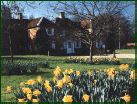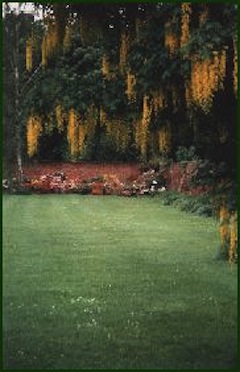Quiet Garden Trust celebrates 15 years... and 300 gardens
January 2, 2008:
 |
 |
 |
The original Quiet Garden at Stoke Poges, Buckinghamshire: near the Country Churchyard where Thomas Gray wrote his Elegy |
In 1993 a British vicar, Revd Philip Roderick, had an idea that private individuals might make their homes and gardens available to others to enjoy sanctuary and stillness for a day, or even just half a day.
This year the Quiet Garden Trust celebrates its 15th anniversary - and the organisers can list more than 300 sites which have become provisional places of sanctuary, solitude, prayer and spiritual nurture. The list runs across five continents, and includes a range of places from private homes to city prisons, AIDs clinics and country churchyards.
“Plant a small seed and wait for it to grow,” says coordinator Mollie Robinson. “From its small scale beginnings, the Quiet Garden Trust has today become an international organisation.”
She explains that Revd Roderick grew up in the Celtic tradition “where spiritual and sacred were not confined to church or chapel but exulted in upon the hills and sea shores, and besides the hearth”. His inspiration was the example of Christ who, at times of transition and challenge, regularly withdrew to pray in places of rugged natural beauty.
As a result, Revd Roderick initiated this comparatively simple, low cost and laccessible ministry of hospitality and prayer. He believed that by encouraging private individuals to share their beautiful gardens for others to enjoy stillness for a moment, he could create places of peace and welcome, where people could “articulate, embody and share the radiant presence of God pouring through the sacrament of nature”.
This original idea then also took root in churches, hospitals and other places able to provide a space, large or small, for contemplation and stillness.
There is a quiet garden in Uganda for AIDS patients and carers, another for the homeless and drug addicts in London, others for busy housewives, the elderly… “the possibilities are endless,” Ms Robinson said.
Each garden space expresses the vision differently according to both its own character and local needs.
For example, a Catholic church in Stainforth, Doncaster. reclaimed derelict land with the help of prisoners at a nearby prison and Polesworth Abbey in Warwickshire has created a garden with sensory devices for the blind.
 |
 |
 |
The idea was that encouraging private individuals to share their beautiful gardens could create places of peace where people could "embody and share the radiant presence of God pouring through the sacrament of nature”. |
“There are two things at work – the facilitation of prayerfulness and inner stillness, and providing the opportunity to dig deeper into spiritual riches. This reflective ministry looks within in order to reach out: it enables faith-based action through contemplation.”
For its next 15 years the Movement is exploring the idea of expanding further into prisons after the first Quiet Prison Garden was established in HMP Bedford.
After a visit and talk from Revd Roderick, a member of prison staff took the initiative, and with the help of a local Christian eager to use his gardening skills, a formerly sterile outdoor environment was transformed into an attractive and colourful garden area, with shrubs, patio pots and improved seating.
The success of this area has created inspiration for the development of another previously neglected exercise area in the prison. It had a concrete slab floor, high wire walls, broken seating and two raised concrete beds. Now it is a garden, and a refuge for some of the inmates at the prison's healthcare centre. Trustees and staff of the Quiet Garden Trust are excited at the possibilities that the idea might nurture in other prisons and secure areas.
For more information about the Trust please contact Mollie Robinson at quiet.garden@ukonline.co.uk
Web address: http://www.quietgarden.co.uk
Phone: +44 (0)1753 643050
|

